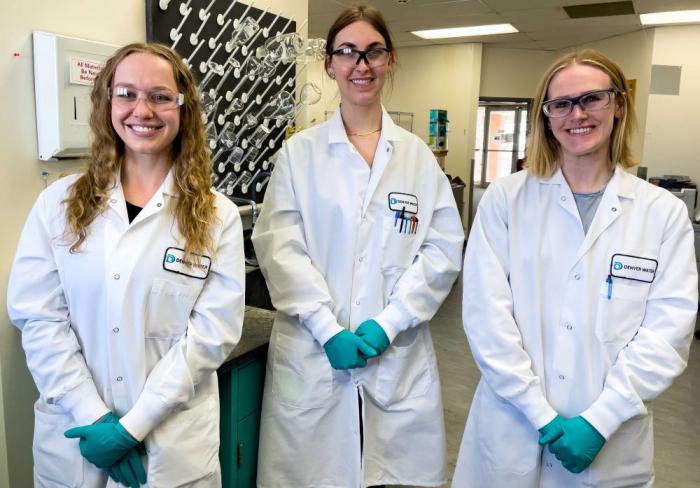Women in STEM — and water
Women at Denver Water hold a variety of roles at the utility organization that is responsible for supplying clean drinking water to 1.5 million people in Colorado’s capital city and surrounding suburbs.
Their jobs take them into the office, the field and the laboratory.
Four who work in the utility’s water quality and treatment division, including division director Nicole Poncelet-Johnson, shared what they love about science and their jobs.
And they encouraged the next generation to follow in their footsteps, given that women are underrepresented nationwide in the STEM fields of science, technology, engineering and math.
While women make up 48% of the overall workforce in the United States, they account for only 34% of the STEM workforce, according to the National Girls Collaborative Project, which encourages girls to enter the STEM fields.
Meet: Charlotte Roadcap, water quality laboratory technician
“I grew up in the era of Sally Ride (the first American female astronaut) and Ms. Frizzle (of the Magic School Bus series). That was a good way to get into science and I always loved it,” said Charlotte Roadcap, who calls her role in Denver Water’s water quality lab her “dream job.”
As a laboratory technician, Roadcap analyzes water samples from watersheds, streams, reservoirs, distribution pipelines and homes.
“To anyone who is considering a career in science, I can’t tell you a better way to spend your life. I always wanted to go into science knowing that when I come home at the end of the day, I know that what I did that day mattered,” Roadcap said.
Meet: Abbie Wright, senior water quality laboratory technician
“Ever since I was a little girl, I've loved science. I've always been fascinated by the why and the how behind things,” said Abbie Wright, a senior water quality laboratory technician.
Wright encouraged young women to stick with science if they love it, even though it sometimes can be intimidating to be in classes where most of the students are men.
“As women, we are stronger together, so just know that we are all here to support each other. Definitely pursue science if you want to. It is fascinating. It's challenging, it's interesting and it's meaningful. So go for it. Yeah, science is fun,” Wright said.
Meet: Kait Counter, lead water quality laboratory technician
Kait Counter, a lead technician in the water quality lab, has loved science as long as she can remember.
“I think I’ve always been interested in how and why things work and really getting down into the nitty gritty,” Counter said.
“Here at the lab, I run a number of analyses, all ensuring the safety of our water — anywhere from testing coliform in the lab to testing for lead.”
Meet: Nicole Poncelet-Johnson, director of water quality and treatment
Nicole Poncelet-Johnson, director of Denver Water’s water quality and treatment, whose teams test and treat the utility’s water as it travels through mountain watersheds, treatment plants and to customers, wanted to help people by being a doctor when she grew up.
Instead, she pursued environmental engineering to help both the environment and public health.
“It’s been a very rewarding career. I have been able to work with water utilities across the nation to improve their water service,” Poncelet-Johnson said.
“If I had one message for all you young ladies out there who are interested in science, it’s ‘Go for it!’ You can make a difference and you can change the world.”


